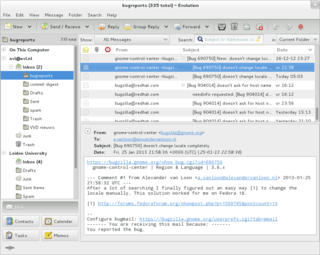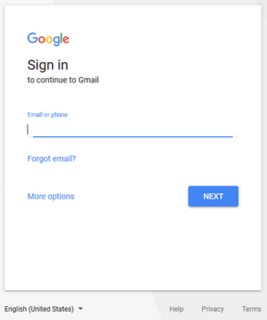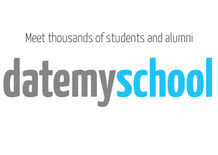
Electronic mail is a method of exchanging messages ("mail") between people using electronic devices. Email was thus conceived as the electronic (digital) version of, or counterpart to, mail, at a time when "mail" meant only physical mail. Email later became a ubiquitous communication medium, to the point that in current use, an e-mail address is often treated as a basic and necessary part of many processes in business, commerce, government, education, entertainment, and other spheres of daily life in most countries. Email is the medium, and each message sent therewith is called an email.
An email address identifies an email box to which messages are delivered. While early messaging systems used a variety of formats for addressing, today, email addresses follow a set of specific rules originally standardized by the Internet Engineering Task Force (IETF) in the 1980s, and updated by RFC 5322 and 6854. The term email address in this article refers to addr-spec in RFC 5322, not to address or mailbox; i.e., a raw address without a display-name.
Various anti-spam techniques are used to prevent email spam.
Disposable email addressing, also known as DEA or dark mail, refers to an approach which involves a unique email address being used for every contact, entity, or for a limited number of times or uses. The benefit is that if anyone compromises the address or utilizes it in connection with email abuse, the address owner can easily cancel it without affecting any of their other contacts.
The eCRUSH network consisted of two sites: eCRUSH.com and eSPIN.com. The network was acquired by Hearst Media on December 31, 2006. The original eCRUSH site was opened on Valentine's Day, 1999 in Chicago by Clark Benson and Karen DeMars Pillsbury. It pre-dated social networking sites such as Friendster.com, MySpace.com and Facebook.com.
Emailtracking is a method for monitoring the delivery of email messages to the intended recipient. Most tracking technologies use some form of digitally time-stamped record to reveal the exact time and date that an email was received or opened, as well as the IP address of the recipient.
WAYN is a social travel network. Its stated goal is to help discover where to go and meet like-minded people. WAYN was founded in 2002.

The public history of Gmail dates back to 2004. Gmail, a free, advertising-supported webmail service with support for Email clients, is a product from Google. Over its history, the Gmail interface has become integrated with many other products and services from the company, with basic integration as part of Google Account and specific integration points with services such as Google+, Google Calendar, Google Drive, Google Hangouts, Google Meet, YouTube, and Google Buzz. It has also been made available as part of G Suite. The Official Gmail Blog tracks the public history of Gmail from July 2007.
classmates.com is a social networking service. It was founded on November 17, 1995 by Randy Conrads as Classmates Online, Inc.
The Deleting Online Predators Act of 2006 (DOPA) is a bill brought before the United States House of Representatives on May 9, 2006 by Republican Pennsylvania Representative (R-PA) Mike Fitzpatrick. The bill, if enacted, would have amended the Communications Act of 1934, requiring schools and libraries that receive E-rate funding to protect minors from online predators in the absence of parental supervision when using "Commercial Social Networking Websites" and "Chat Rooms". The bill would prohibit schools and libraries from providing access to these types of websites to minors or create restrictions to use of these type of sites. The bill also would require the institutions to be capable of disabling the restrictions for "use by an adult or by minors with adult supervision to enable access for educational purposes."
Flixster was an American social-networking movie website for discovering new movies, learning about movies, and meeting others with similar tastes in movies. The site allowed users to view movie trailers as well as learn about new and upcoming movies at the box office. It was based in San Francisco, California and was founded by Joe Greenstein and Saran Chari on January 20, 2006. Flixster was the parent of website Rotten Tomatoes from January 2010. On February 17, 2016, Flixster, including Rotten Tomatoes, was acquired by Fandango.

Tagged is a social discovery website based in San Francisco, California, founded in 2004. It allows members to browse the profiles of any other members, and share tags and virtual gifts. Tagged claims it has 300 million members as of 2014. As of September 2011, Quantcast estimates Tagged monthly unique users at 5.9 million in the United States, and 18.6 million globally. Michael Arrington wrote in April 2011 that Tagged is most notable for the ability to grow profitably during the era of Facebook.

NK.pl, formerly Nasza-klasa.pl, was a Polish school-based social networking service used by alumni and students. NK.pl was owned and administered by Ringier Axel Springer Polska.
Google Friend Connect was a free social networking site from 2008 to 2012. Similar in practice to Facebook Platform and MySpaceID, it took a decentralised approach, allowing users to build a profile to share and update information via third-party sites. These sites acted as a host for profile sharing and social exchanges.

The Gmail interface makes Gmail unique amongst webmail systems for several reasons. Most evident to users are its search-oriented features and means of managing e-mail in a "conversation view" that is similar to an Internet forum.
Monochrome BBS, known to users as "Mono," is a text-based multi-user bulletin board system featuring thousands of discussion files, along with games, user messaging, and a talker. As of April 2021 it is one of the few BBS's still in operation and actively used on a daily basis by its community. Monochrome runs on custom software, making the platform and user experience distinct from other bulletin board systems.
Apple ID is an authentication method used by Apple for iPhone, iPad, Mac and other Apple devices. Apple IDs contain user personal information and settings. When an Apple ID is used to log in to an Apple device, the device will automatically use the settings associated with the Apple ID.
Since the arrival of early social networking sites in the early 2000s, online social networking platforms have expanded exponentially, with the biggest names in social media in the mid-2010s being Facebook, Instagram, Twitter and Snapchat. The massive influx of personal information that has become available online and stored in the cloud has put user privacy at the forefront of discussion regarding the database's ability to safely store such personal information. The extent to which users and social media platform administrators can access user profiles has become a new topic of ethical consideration, and the legality, awareness, and boundaries of subsequent privacy violations are critical concerns in advance of the technological age.
Zorpia is a social networking service with customers in China. Zorpia is one of the few international social networks with a Chinese Internet Content Provider license. The social networking site reports 2 million unique users per month and a total worldwide user base of 26 million. Jeffrey Ng is the company's founder and CEO of Zorpia. The privately funded company is based in Hong Kong and has 30 employees.
A web beacon is a technique used on web pages and email to unobtrusively allow checking that a user has accessed some content. Web beacons are typically used by third parties to monitor the activity of users at a website for the purpose of web analytics or page tagging. They can also be used for email tracking. When implemented using JavaScript, they may be called JavaScript tags.




